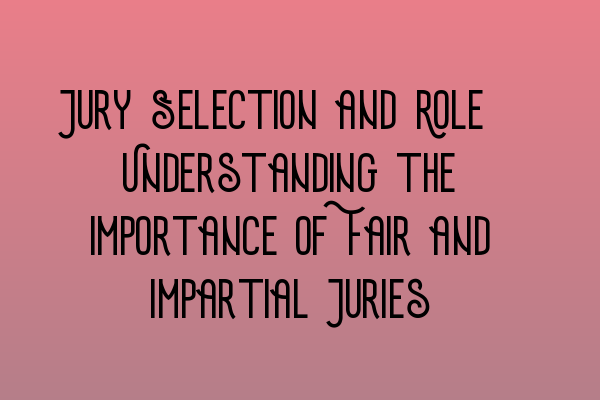Jury Selection and Role: Understanding the Importance of Fair and Impartial Juries
When it comes to criminal trials, one of the cornerstones of the legal system is the presence of a jury. Juries, composed of members of the public, play a vital role in ensuring a fair and impartial trial. In this article, we will delve into the process of jury selection and explore why fair and impartial juries are of utmost importance.
The Importance of Jury Selection
Jury selection is a crucial step in the legal process, as it is the foundation for a fair trial. The goal of jury selection, also known as voir dire, is to choose individuals who can be fair and unbiased in their decision-making process. This selection process ensures that both the prosecution and the defense have an equal opportunity to present their case to a panel of jurors who will carefully consider the evidence presented.
At SQE Criminal Law & Practice Law UK, we understand that the integrity of the jury selection process is paramount. We offer comprehensive SQE 1 Preparation Courses to legal professionals who aim to familiarize themselves with the intricacies of jury selection and improve their understanding of the criminal justice system.
Factors Considered in Jury Selection
During the jury selection process, several factors are taken into account to assess the suitability of potential jurors. These factors include:
- Demographics: The age, gender, occupation, and residence of jurors are taken into consideration to ensure a diverse representation of the community.
- Attitudes and Beliefs: Jurors’ views, biases, and prejudices are explored to identify any potential biases that may affect their ability to impartially assess the evidence.
- Personal Experiences: Jurors’ personal experiences, such as previous involvement in legal matters, may be considered to evaluate their ability to remain objective.
To gain a better understanding of the different factors that influence jury selection, we recommend taking a look at our article on SQE 1 Practice Exam Questions.
The Role of a Jury
Once the jury is selected, their role is to impartially evaluate the evidence presented during the trial. It is crucial for the jury to set aside any preconceived notions or biases and base their decision solely on the evidence presented in court.
Our SQE 2 Preparation Courses at SQE Criminal Law & Practice Law UK provide extensive guidance on the responsibilities and duties of jurors. We believe that educating legal professionals about the intricacies of jury deliberation can lead to fairer outcomes in criminal trials.
Challenges in Voir Dire
While jury selection aims to ensure the formation of a fair and impartial jury, it is not without its challenges. A major challenge is the potential for inherent biases and prejudices among potential jurors. Identifying and addressing these biases is crucial to maintaining the integrity of the legal process.
Our article on SQE 1 Practice Mocks FLK1 FLK2 delves deeper into the challenges faced during jury selection and offers strategies to overcome them.
Conclusion
Fair and impartial juries are the bedrock of our criminal justice system. The process of jury selection plays a pivotal role in achieving this goal. By carefully considering the demographics, attitudes, beliefs, and personal experiences of potential jurors, we can create a balanced and unbiased panel capable of upholding justice.
If you are interested in learning more about the legal process or staying updated with SRA SQE Exam Dates, we encourage you to explore our website for more informative articles and resources.
